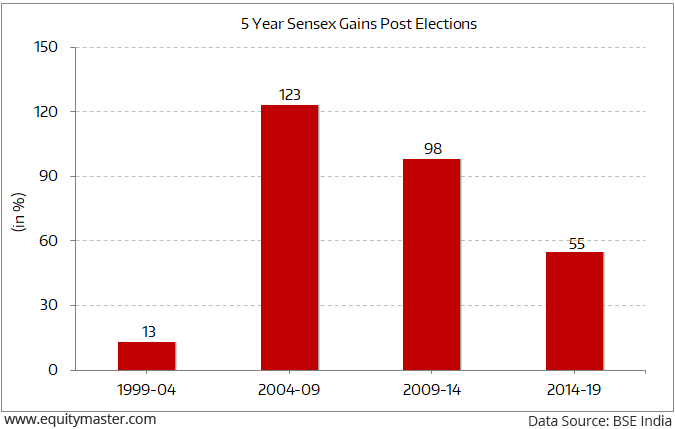India's Third Giant Leap
This Could be One of the Biggest Opportunities for Investors
- Home
- Todays Market
- Indian Stock Market News June 13, 2019
Indian Indices Extend Losses; Yes Bank Slips Over 10% Thu, 13 Jun 12:30 pm
Share markets in India are presently trading on a negative note. Barring capital goods sector and power sector all sectoral indices are trading in red with stocks in the automobile sector, banking sector and healthcare sector witnessing maximum selling pressure.
The BSE Sensex is trading down by 253 points (down 0.6%), while the NSE Nifty is trading down by 79 points (down 0.7%). The BSE Mid Cap index is trading down by 1%, while the BSE Small Cap index is trading down by 1.2%.
The rupee is currently trading at Rs 69.38 against the US$.
Notably, Indian markets have been on the rise since the Narendra Modi-led coalition won a massive mandate to form the government for the second consecutive time.
In May, the benchmark Sensex rose 1.8%. In the year so far, Sensex has gained over 10%.
So, by the next elections in 2024, will Sensex touch 1,00,000 mark?
Does Sensex 1,00,000 sound outrageous from where we are right now?
Even Sensex 40,000 would have seemed the same from around 5,000 levels in May 2004.
History indicates a healthy rise in Sensex post elections. In the three elections prior to this, we have seen a government come back to power, and change hands but the Sensex has moved one way i.e. upwards.
Will the Sensex Be Close to 1,00,000 By the Next Election?
And now, with a stable government at the centre, the pace might pick up.
Co-head of research, Tanushree Banerjee believes there are 50 irreversible trends that will the push Sensex to 1,00,000.
And these 50 trends look set to play out soon.
The ride might have already begun looking at the stock market's reaction to the election results.
But it is still early days. And the time to hop on to the ride is right now!
In the news from the aviation space, shares of Jet Airways fell over 20% today after stock exchanges decided to impose trading restrictions on the debt-laden airline.
According to a circular issued by NSE, the decision was taken as a part of preventive surveillance measures to curb excessive volatility. The decision would be effective from 28 June.
The stock exchange notified that the shares of the airline will be shifted from rolling segment to trade for trade segment, wherein the settlement in the scrip will take place on gross basis with 100% upfront margin and 5% price band.
Trading in the futures and options (F&O) segment of the exchanges will also be removed. The exchanges also cited the company's failure to submit financial results for the year ended 31 March, as well as observations made by its auditor, as reasons for its decision.
Several people from the top management have left the company in the past few months. Lenders to the cash-strapped airline, led by the State Bank of India (SBI), are seeking investors to recover their dues.
The airline's total liability, including unpaid salaries and vendor dues, is nearly Rs 150 billion. In any case, if Jet Airways is admitted to the National Company Law Tribunal, under bankruptcy resolution lenders may recover only a fraction of the Rs 84 billion the airline owes them.
Moving on to the news from the banking sector, Yes bank share price is in focus today. Stock of the lender is witnessing selling pressure today after foreign brokerage firm UBS cut its target price.
As per an article in The Economic Times, the brokerage has maintained its sell rating on the stock as it expects more asset-quality pressure than consensus, given the bank's higher exposure to stressed corporates and lower recognition of these loans as gross non-performing loans.
Here's an excerpt from the article:
- UBS said that a sustained economic slowdown could impact the banking and finance sector on several fronts, including a slowdown in loans and higher non-performing loan risk, while affecting fee income and exerting pressure on net interest margin.
Selling is also seen as the lender's board in its AGM, avoided shareholder queries on Rana Kapoor's future at the bank.
The bank issued a clarification to stock exchanges denying reports that suggested that founder Rana Kapoor demanded a board seat and compensation that triggered directorial exits by independent members earlier in the week.
Earlier this week, rating agency Moody's also placed the bank's ratings under review for a downgrade.
The agency placed Yes Bank's ratings under review for a downgrade citing its large exposure to debt-laden non-banking financial companies (NBFC) and the possibility that the bank's loans under watch list could slip into non-performing assets (NPAs).
Meanwhile, Mukesh Sabharwal, chairman of the nomination and remuneration committee of the bank, quit on Tuesday citing personal reasons.
Earlier, ICRA had downgraded Yes Bank's tier-I and tier-II bonds and infrastructure debt on deterioration in the credit quality of large ticket borrowers.
Yes bank share price is presently trading down by 11.5%.
For information on how to pick stocks that have the potential to deliver big returns, download our special report now!
Read the latest Market Commentary



Equitymaster requests your view! Post a comment on "Indian Indices Extend Losses; Yes Bank Slips Over 10%". Click here!
Comments are moderated by Equitymaster, in accordance with the Terms of Use, and may not appear
on this article until they have been reviewed and deemed appropriate for posting.
In the meantime, you may want to share this article with your friends!